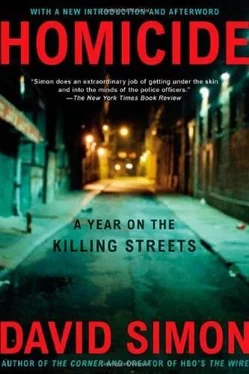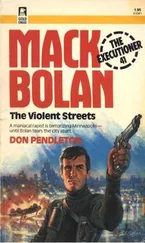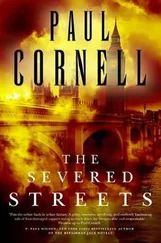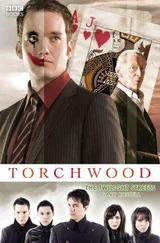Two tables away, Gene Cassidy sips quietly at a soda, laughing at the occasional joke. He and Patti will be there for an hour or two, long enough for McLarney to bring the young juror by for an introduction an hour or so later.
“Thank you,” says Cassidy to the girl. “You know you did the right thing.”
“I know it,” she says, a little unnerved. “Good luck to you, with the baby and all.”
McLarney listens to the exchange and smiles from the bar, already a little bit drunk. The gathering plays out until it is soon a little after one in the morning and Nicky comes out from behind the bar to begin cleaning tables. Cassidy is gone, followed by Belt and Tuggle and Gersh. McLarney, Moulter, Biemiller and a few others remain as the young juror finally gathers up her things.
“We’re going down to Clinton Street after we close this place,” McLarney tells her. “You’re welcome to come.”
“What’s Clinton Street?”
“Hallowed ground,” jokes another cop.
Even before the girl can answer, McLarney feels the awkwardness of his own suggestion. The end of Clinton Street is the best hole in the Southeastern District, but it’s nothing more than a rotting wharf. This girl here is normal. A civilian.
“Clinton Street is this pier a few minutes from here,” McLarney explains, embarrassed. “Vince is going to go get some beer and we’re going to meet him there. It’s no big deal.”
“I’ve got to get home,” she says, uncomfortably. “Really.”
“Okay, then,” says McLarney, relieved in a way. “Vince can drive you to your car.”
“Thanks for the beer,” she says. “I’ve got to say, I wouldn’t want to go through it again, but it’s been an interesting experience. Thanks.”
“No,” says McLarney. “Thank you.”
Vince Moulter leaves with the girl. McLarney finishes his beer and drops a tip on the bar for Nicky. He checks himself for car keys, wallet, badge, gun-the usual barroom inventory that tells McLarney he’s good to go.
“You thought she’d want to go to Clinton Street?” asks Biemiller, looking at him with raised eyebrows.
“You don’t get it,” McLarney tells him, irritated. “She’s a hero.”
Biemiller smiles.
“Who’s coming?” asks McLarney.
“You, me, Vince, maybe a couple of the others. I told Vince to get a couple cases.”
They leave in separate cars, driving east and south through the rowhouse neighborhoods of Fells Point and Canton. They pick up Clinton Street at the harbor’s edge, then drive south for a quarter mile, where the road dead-ends in the shadow of the Lehigh Cement towers. To the right, as they spill from their cars, is a corrugated iron warehouse. To the left, a battered shipping terminal. The night is warm and the harbor water gives off a slight, garbage scow stench.
Ten minutes behind the others, Moulter shows up with two cases of Coors Light. McLarney and the other Western hands pick up where they left off, their voices growing louder, less restrained, in the warm spring night. Moulter finds an FM station and cranks the car stereo. An hour passes with nothing more than shop talk and station house humor; McLarney does his bit, tossing a few amusing homicide tales into the kitty.
Soon there are two dozen silver empties bobbing in the harbor waters or lying dead against the metal side of the warehouse.
“A toast,” says Biemiller.
“To the Western.”
“No. To Gene.”
“To Gene.”
They drink and Moulter cranks the radio higher. It is several minutes before they notice a lone figure, a foreman perhaps, near the warehouse gate.
Biemiller sees him first.
“Sarge. Over there.”
McLarney pushes his glasses back up the bridge of his nose. The foreman is just standing there, staring at them.
“Don’t worry about it,” McLarney tells them. “I’ll handle this.”
McLarney grabs a fresh can-a peace offering of sorts-and walks toward the warehouse gate. Leaning over the railing of a metal landing, the foreman stares down with undisguised contempt. McLarney smiles back apologetically. “How’s it going?” he says.
The man spits. “Ain’t you assholes got nothing better to do than come down here all drunk and raising hell? Who the hell you think you are?”
McLarney looks down at his shoes, then back up at the foreman’s face. His voice is only a little bit better than a whisper. “I don’t suppose,” he says, “that you’d want to come down here and say that.”
The foreman doesn’t move.
“I didn’t think so.”
“Fuck you,” the man replies, turning back through the gate. “I’m calling the cops.”
McLarney saunters back to the end of the pier, where the other revelers look at him quizzically.
“What’d he say?” asks Moulter.
McLarney shrugs. “We reached an understanding. He’s calling the police and we’re getting the hell out of here.”
“Where to?”
“Somewhere close.”
“Calverton?”
“Calverton.”
The beers are quickly divided and they pile into three cars. At the sound of the engines, the foreman runs back to the gate, checking license tags. They race up Clinton Street with their headlights out, fugitives in their own city.
“Terry, maybe we ought to go home,” says a younger officer in McLarney’s car. “We keep going like this and we’ll get an IID number. Hell, we might even get locked up at this rate.”
McLarney offers a look of contempt. “No one’s gonna get locked up,” he says, wheeling his Honda Civic west along the Boston Street waterfront. “Have you forgotten that you’re in Baltimore? Nobody ever gets locked up in this fucking city. Why should we get treated different than any other criminal?”
McLarney laughs at his own logic, then guns the Civic through the streets just south of Little Italy, then west across the early morning vacancy of the city’s downtown. Street cleaners and newspaper delivery trucks own the streets now, and the traffic signals have gone from green and red to flashing yellow. Across from the Omni on Fayette, a lone derelict is dissecting the contents of a trashcan.
“It’s four A.M., Terry.”
“Yes,” says McLarney, checking his watch. “It is.”
“Where the hell are we going?”
“Where every wanted criminal goes to hide.”
“The Western?”
“The Western District,” says McLarney, triumphant. “They’ll never find us there.”
And soon enough, it is 5:00 A.M. and eight or nine more 16-ounce cans are lying spent in a Calverton Road gutter. The party is down to a foursome now, the others having fled before the threat of sunrise. Of the group, only Bob Biemiller is still a Western man. McLarney has been downtown in homicide ever since he took that bullet on Arunah Avenue; Moulter has transferred to Southeastern patrol. But they are together again on Calverton Road because it is the morning after the night after a city jury brought the Cassidy case to an end. And even after being chased off the Clinton Street pier, they still cannot go home.
McLarney rolls another empty into the pile, where it clatters against its brethren. Biemiller grabs a replacement from the back seat and hands it to McLarney, who shifts his weight against the car’s front fender.
“So, So, Vince, what do you think?” McLarney says, pulling the metal tab. White foam races around the rim of the can and down its sides. The sergeant mumbles an obscenity and shakes the wetness from his hand.
Moulter smiles vaguely. “What do I think?”
“About Gene.”
About Gene. All this drinking, all this bullshitting, all this riding around Baltimore like a pack of motorized Gypsies but McLarney still isn’t satisfied. Somehow the damn thing is still there to be reckoned with. At this moment, Appleton Street is the only station house story worth telling, and at this moment it demands some kind of moral.
Читать дальше












